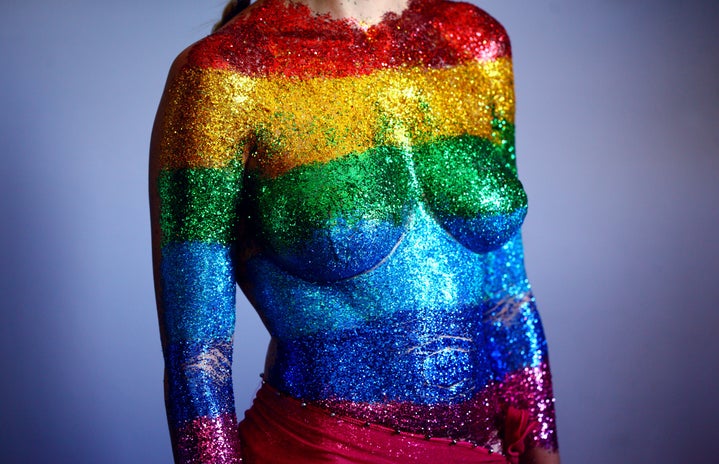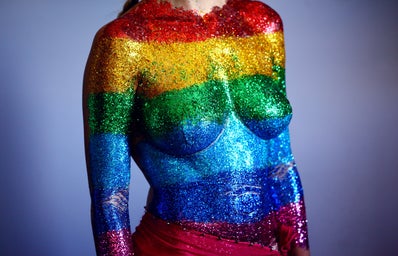This Halloween season, there is increasing discussion regarding Halloween costumes and cultural appropriation. While this issue has been covered by media for several years now, there are many people who still don’t, or refuse to, get it. Around this time every year, we can view YouTube videos discussing the harm which can come from the inappropriate use of another culture’s clothing and symbols. The # IAmNotACostume social movement is finally producing greater awareness that blackface and ‘Indian Princess’ costumes are not suitable to dress up in and go to that next Halloween party. While most people have become more sensitive to the problems with cultural appropriation, there is still a lack of understanding or sensitivity for problems related to ‘sexy’ Trans women or ‘Drag Queen’ costumes. Some of this can even be related to transphobia or Queer discrimination and mockery.
A perfect example of this is the ‘Caitlyn Jenner’ costume sold through Amazon last year (2018) for just under $65.00 CDN. The set included a brunette wig, a sports top and shorts, an Olympic medal (made out of plastic) and a mock pin-on marathon number. The model featured on the package showed a bearded male flexing his arms while wearing his very own Caitlyn Jenner costume. The promotion on the web page read: “Show your love for Caitlyn Jenner with this awesome adult costume.” The problems with this item should have been clear – the costume not only ridiculed the idea that Caitlyn was an actual woman, but it made a mockery of a potentially painful past for Caitlyn. Despite demands from the transgender community to remove the offending costume, Amazon continued to sell it throughout the season. Transgender activists spoke out publically, explaining that this type of costuming promoted hatred, transphobia, and gender tyranny. Sadly, a quick Google search for the Caitlyn Jenner costume this year shows that the costume is still being displayed and sold on Amazon for Halloween 2019.
Males who are not part of or allied with the Drag performance community and decide to dress as a Drag Queen for Halloween could be engaging in problematic behavior as well. While I am a Trans woman, I myself choose not to perform Drag. The reason for this personally is simple – my gender performance as a female is difficult enough as it is, without others deciding I am little more than a ‘male’ in women’s clothing. I have the greatest respect for others who chose to perform in Drag, however. My thought, therefore, was that it would be beneficial to discuss the issue with a well known Drag performer in the area, Athena McQueen. Athena has been a Drag performer for many years now. She began her career after watching the documentary, Paris is Burning. Produced in 1990, this documentary traced the lives of Drag Queens in New York, dealing with issues of marginalization, racism, hate, and poverty.
When I asked Athena why she performed, and why it was important to her, her answer was critical to the costume question.
“At its core, I think it liberates queer and trans people. I think it is healing, and that there is something really empowering and freeing about getting up on stage.”
Athena explained further that Drag as an art form was critical for the health and well being of people in the Queer community, because it is something that they both create and perform. Drag is empowering, because it allows performers to give voice to their identities and take back space which is often denied to them in main stream society. Drag performers often create stage personas which are extended and ‘larger’ versions of who they really are. Performers are not just male – all gender identities are welcome to the stage. Although their persona may seem ‘bigger-than-life’ and emotionally flamboyant, the performance gives them an outlet for empowerment, encouragement, and recognition for who they really are. As a group, Drag performers will often form tight communities that support them in all aspects of life. This is an important element to the definition of ‘culture’. Queer identity displayed as Halloween costume cannot serve or support individuals living in that culture.
Finally, I asked Athena what she thought about the idea of men dressing as Drag Queens for Halloween. After first making it clear that she wasn’t in the business of ‘policing’ what other people chose to wear for Halloween, she explained that the choice came down to intent. If someone who supported the community came to her for advice and help to dress in Drag, she wouldn’t hesitate to give support. On the other hand, if someone chose that costume without any desire to support the community or to get advice from performers themselves, it could cause a good deal of harm to others.
A Drag Queen is a very real identity, just as a transgender individual is. Intent is an important word. Is dressing as a Trans woman or Drag Queen problematic cultural appropriation? If the intent is to mock or satirize real people in the Queer community, the answer is clear. This Halloween, this Trans woman would ask everyone to seriously consider what the real intent of your special costume is. Importantly, it is never alright to wear a transgender costume. Being transgender is an identity and not an outfit. Dressing up for Halloween as, say, Caitlyn Jenner, is violently harmful to not just her, but to a very large community who is very real – # IAmNotACostume.



